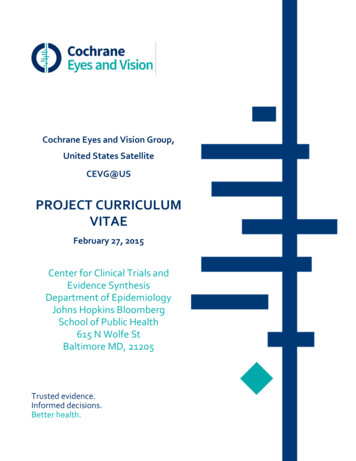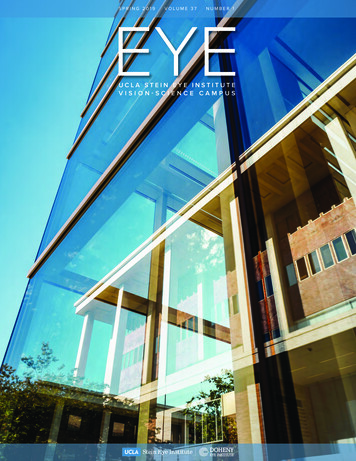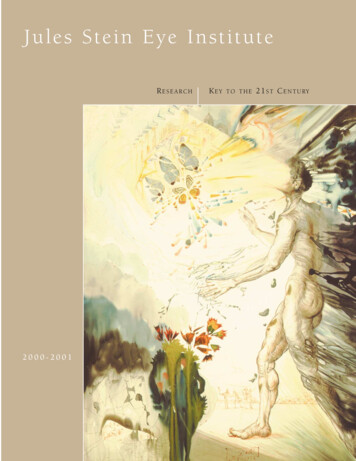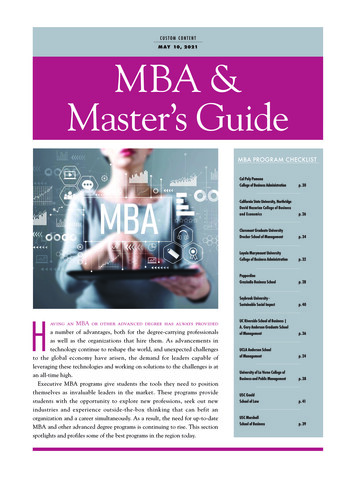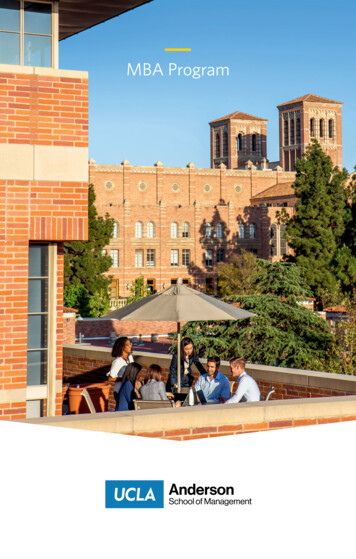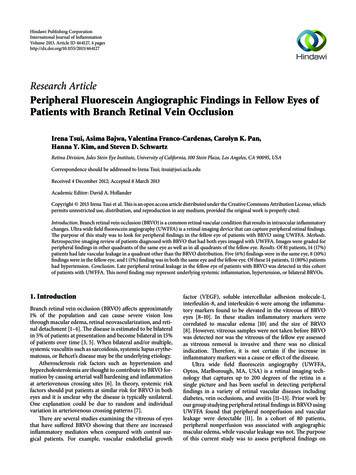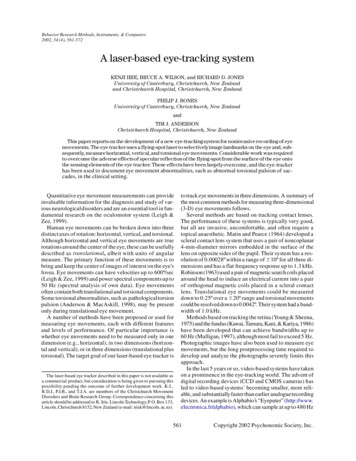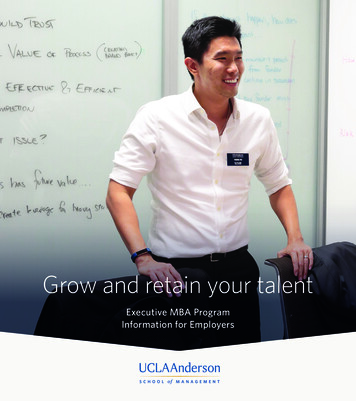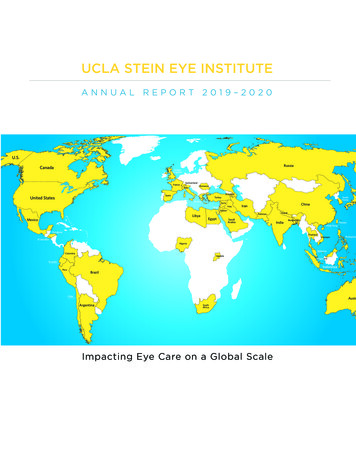
Transcription
UCLA STEIN EYE INSTITUTEANNUAL REPORT zerlandItalyRomaniaSpainUnited HondurasNepalIndiaBangladeshHong KongThailandEl ChileAustrArgentinaSouthAfricaImpacting Eye Care on a Global Scale
UCLA Stein Eye InstituteANNUAL REPORTJuly 1, 2019–June 30, 2020DIRECTORBartly J. Mondino, MDMANAGING EDITORTina-Marie Gauthierc/o Stein Eye Institute100 Stein Plaza, UCLALos Angeles, California 90095–7000Tina@EyeCiteEditing.comPUBLICATION COMMITTEEAnthony C. Arnold, MDKevin M. Miller, MDAlfredo A. Sadun, MD, PhDAlapakkam P. Sampath, PhDCONTRIBUTING EDITORSLauren BayansTeresa ClossonSusan ItoPeter J. LópezKara MondinoEllen PascualDarlene VillegasCONTRIBUTING WRITERSDan GordonHarlan LeboPHOTOGRAPHYReed HutchinsonRobin WeiszDESIGNRobin Weisz/Graphic DesignPRINTINGMarina Graphic CenterTo view the Annual Report online, visit:www.uclahealth.org/Eye/annual-report.For more information about theUCLA Department of Ophthalmology, see:www.uclahealth.org/eye/. 2020 by the Regents of theUniversity of California.All rights reserved.
1Impacting Eye Care on a Global Scale4Year in Review17Philanthropy25Eye Health Programs33Faculty and Colleagues69Research and Funding101About the Institute
LETTER FROM THE CHAIRScottish Poet Robert Burns wrote that, “The best laid schemeso’ mice an’ men / Gang aft a-gley.” And this academic year, thenovel coronavirus (COVID-19) has certainly challenged our abilitiesto proceed in typical fashion.The safety of our patients, always of tantamount importance, hastaken on new facets. Gary N. Holland, MD, Jack H. Skirball Chair inOcular Inflammatory Diseases, has a leadership role in fightingagainst the spread of COVID-19 both here in the United Statesand beyond. A renowned infectious disease specialist, Dr. Hollandand two colleagues were asked by the American Academy ofOphthalmology (AAO) to create guidelines for ophthalmologists onpreventing transmission of this highly contagious virus during eyeexaminations and surgery. Their authored pages on the AAOwebsite have been viewed over 1.5 million times as of this writing.Many of our educational events this academic year were cancelledor held remotely. During the pandemic’s height, our outpatientvisits and surgical procedures were down to 25% of normal,and we were only seeing urgent or emergent cases. In thecurrent ramp up, we are now at over 80% of pre-COVID levelsfor outpatient care and exceeding pre-COVID surgical cases,perhaps due to backlog.Preserving sight and ending avoidable blindness is our mission,and UCLA Department of Ophthalmology faculty, fellows, residents, and staff are committed to this challenge. Demonstratingtrue collaboration and selflessness, their priority—as it has beensince the UCLA Stein Eye Institute opened its doors in 1966—isfocused on the health and well-being of our patients.Private funding, especially in these uncertain times, remains criticalto our ability to advance vision science and clinical care. I wish youand your family well, and I thank you for your support.Sincerely,Bartly J. Mondino, MDBradley R. Straatsma, MD, Endowed Chair in OphthalmologyDirector, Stein Eye InstituteChairman, UCLA Department of OphthalmologyAffiliation Chairman, Doheny Eye Institute
Impacting Eye Careon a Global dItalyRomaniaSpainUnited diArabiaIndiaBangladeshHong KongThailandEl BrazilChileAustraliaArgentinaSouthAfricaThe UCLA Department of Ophthalmology’srenowned International Fellowship Programhas trained more than 250 ophthalmologistsfrom countries worldwide—doctors whonot only become more accomplished clinicians and researchers, but also trailblazersfor improving vision care around the globe.A Year in Review UCLA STEIN EYE INSTITUTE 1
UCLA INTERNATIONAL FELLOWSHIP PROGRAM“I chose the Fellowship Program because ofits international reputation, and alsobecause of my customized fellowship planthat combined exposure to the clinical andresearch aspects of glaucoma with study ofepidemiology and public health issues.”FOTIS TOPOUZIS, MDChair, Department of OphthalmologyAristotle UniversityThessaloniki, GreeceThe International Fellowship Program is offered toophthalmologists throughout the world and features a one-year immersion in training under thementorship of faculty from the UCLA Departmentof Ophthalmology. The training for each fellow is unique— customized to meet the interests of the individual participantin subspecialties that include cataract; corneal-external ocular disease, uveitis, and refractive surgery; glaucoma; medicalretina; neuro-ophthalmology; ophthalmic pathology; orbitaland ophthalmic plastic surgery; pediatric ophthalmologyand strabismus; and vitreoretinal diseases.Since the Institute began training an annual cadre of international fellows in the early 1990s, more than 250 fellowsfrom countries worldwide have been certified. The Programis distinctly positioned to train international fellows becauseof the unique strengths of the UCLA medical enterprise. Thebroad range of services in premier UCLA-affiliated teachinghospitals and diverse patient populations across SouthernCalifornia, depth of research programs, access to large-scaleclinical trials, and connections to other medical and scientific programs on the UCLA campus provide an opportunityfor enhanced study that is singular in ophthalmic training.“We work to inspire a sense of responsibility for leadership and innovation that our international fellows can useto train the next generation of ophthalmologists around theworld,” says Bartly J. Mondino, MD, chair of the Departmentof Ophthalmology and director of the Stein Eye Institute. “Weachieve our greatest success when our fellows become theinnovators in their own countries.”International expertise: a two-way exchange“The International Fellowship Program hascontributed significantly to shaping thecareers of doctors in many countries, andthe Program has tirelessly contributeddirectly to the benefits of patients all overthe world.”RAMESH KEKUNNAYA, MDDirector, Child Sight InstituteL V Prasad Eye InstituteHyderabad, India2 UCLA STEIN EYE INSTITUTE A Year in ReviewThe Program promotes interaction in research and education with ophthalmology institutions throughout the world,encouraging a two-way opportunity for learning, with theinternational fellows and Department doctors sharing theirexpertise and methods for dealing with the unique challenges for vision care and research.“The knowledge and perspective of our internationalfellows improves the experience and performance of ourfaculty, fellows, and residents here in Southern California,”says Anne L. Coleman, MD, PhD, The Fran and Ray StarkFoundation Chair in Ophthalmology.“Not only are the international fellows learning from us,”says Dr. Coleman, “but we are also learning from them,gaining insight into other cultures and countries in terms ofhow we can all treat patients with eye diseases, learn ophthalmology, and conduct research. Their presence at UCLAadds to the vibrant, diverse, and inspiring environment thatwe have here.”
Advancing the fight against blindnessfor generationsThe importance of the Department’s International Fellowship Program was underscored in October 2019, when theWorld Health Organization (WHO) released a new reporton vision and preventable blindness.“At present more than 2.2 billion people around the worldhave a vision impairment, of whom at least 1 billion havea vision impairment that could have been prevented or isyet to be addressed,” states the WHO’s World Report onVision. “The world faces considerable challenges in termsof eye care, including a shortage of trained eye care service providers.”As such, perhaps the most important results producedby the International Fellowship Program are the ophthalmologists worldwide that the Program never sees.The Program’s primary mission is to train and build theexpertise of the 10 to 20 international fellows who participate each year. And key to that mission is inspiring a senseof commitment among the fellows to pass along their expertise to new generations of ophthalmologists in their owncountries and beyond.“Our international fellows elevate the practice of our specialty in their country,” says Robert Alan Goldberg, MD, BertO. Levy Endowed Chair in Orbital and Ophthalmic PlasticSurgery. “By teaching and practicing at the highest level,they innovate in their fields and become role models in theirmedical communities.”The influence of the international fellows touches medical care, research, and training throughout the world, asevidenced by the clinics, academic departments, trainingprograms, research teams, and eye care organizations established and nurtured by the Program alumni.“I chose the Program for the superb faculty,the facilities of the Institute, and thereputation of the Program. The knowledgeI acquired, the experience of working at afirst-level Institute, and the professionalrelationships that came from myinvolvement have helped me to progressin my own career, and also to guide manycolleagues in Latin America. Participating inthe Fellowship Program is one of the bestdecisions I have ever made.”FRANCISCO J. RODRIGUEZ, MDChair, Department of OphthalmologyUniversidad del Rosario School of MedicineBogota, Colombia“We work to inspire a sense ofresponsibility for leadership andinnovation that our international fellowscan use to train the next generation ofophthalmologists around the world. Weachieve our greatest success when ourfellows become the innovators in theirown countries.”BARTLY J. MONDINO, MDChair, UCLA Department of OphthalmologyDirector, Stein Eye InstituteA Year in Review UCLA STEIN EYE INSTITUTE 3
Year in ReviewJULY 1, 2019 –JUNE 30, 2020
Institute NewsNew Grants Fund Vital ResearchResearch funding at UCLA from the National Institutes of Health (NIH) is increasing, and the Stein Eye Institute is a significant beneficiary of this support, which isprovided through the National Eye Institute (NEI).Seven new NIH grants were awarded in 2019 and total nearly 10 million in funding.† These grants give an indication of the scope of basic research within Stein Eyeon key questions affecting the eye.Ava K. Bittner, OD, PhDSmotrich Family OptometricClinician-Scientist ChairAnna Matynia, PhDAssociate Research OphthalmologistGabriel H. Travis, MDCharles Kenneth Feldman Chair inOphthalmologyMechanisms for Light-DrivenChromophore Synthesis by MüllerCells to Regenerate Cone Opsin andMaintain Cone Sensitivity 2,271,848Molecular, Cellular, Anatomical,and Neurobiological Investigationof Melanopsin-Expressing CornealInnervation, and Its Role in Painand PhotophobiaIrena Tsui, MDDevelopment of a BehavioralIntervention with Socially AssistiveRobots to Enhance MagnificationDevice Use for Reading 439,994 1,950,000 445,314Jean-Pierre Hubschman, MDAssociate Professor of OphthalmologyKouros Nouri-Mahdavi, MD, MScAssociate Professor of OphthalmologyIntraocular Robotic Interventionaland Surgical System for Automated Cataract SurgeryDetection of Disease Progression inAdvanced Glaucoma 1,951,500 2,305,000† Amounts shown are the total for all years of NIH funding.Assistant Professor of OphthalmologyRetinal and Choroidal VasculatureChanges in Healthy and High-RiskPregnanciesDavid S. Williams, PhDKarl Kirchgessner Foundation Chair inVision ScienceExploring the Relationship of WaterFlow Across the RPE and MutantMYO7A/Usher 1B 429,000Providing Critical COVID-19 Information to OphthalmologistsGary N. Holland, MD, Jack H. SkirballChair in Ocular Inflammatory Diseases, isworking with two other ocular infectiousdisease specialists, James Chodosh,MD, MPH, of Harvard University, andSteven Yeh, MD, of Emory University,to formulate guidelines for prevention ofCOVID-19 transmission during eye examinations and ophthalmic procedures inthe midst of the SARS-CoV-2 pandemicand to provide American Academy ofOphthalmology (AAO) members withupdated information relevant to the pandemic through its website.In addition to reflecting changingstatistics about the pandemic and toconform to Centers for Disease Control (CDC) and other guidelines as theyevolve, the team is answering questions from A AO members seekingevidence-based clinical guidance ontopics including ‘how can I protect mystaff and patients,’ ‘what personal protective equipment do I need,’ ‘how do I disinfect my office,’ and ‘do antivirals work.’David W. Parke II, MD, chief executiveofficer of the AAO, said of this work, “Thistrio of incredibly talented ophthalmologist clinician-scientists are the ultimateprofessional volunteers who, despiteheavy clinical, teaching, and researchresponsibilities, gave up countless hourseach week and weekend to ensure thatthe material on the Academy coronavirusweb pages was updated at least dailyand reflected careful science.”As of June 30, 2020, the authoredpages at ntext had beenviewed over 1.5 million times.To help reduce the spread of COVID-19,Stein Eye physicians like Dr. Tara McCannel(left) and Dr. Niranjan Manoharan (right) wearprotective goggles and gloves duringprocedures. Rooms and equipment arecleaned and disinfected before every patientexamination.A Year in Review UCLA STEIN EYE INSTITUTE 5
New Clinic Focused onTreating Dry EyePersistent and more serious forms ofdry eye require focused diagnosis andtreatment to maintain the health of youreye, and the new Dry Eye Clinic on theUCLA Stein Eye Institute vision-sciencecampus was developed for this purpose.Dry eye occurs when the glandsaround the eye cease to produce enoughtears to keep the surface of the eyemoist. Dry eye can may be associatedwith aging, diabetes, autoimmune diseases, certain medications, and dryclimates.“The UCLA Stein Eye Institute’s DryEye Clinic implements a full diagnosticworkup looking at all the different parts ofthe ocular surface that can contribute todry eye, and then we tailor a specializedtreatment focused on each patient’s individual needs” says Vivian Shibayama,OD, clinical instructor in ophthalmology,who runs the clinic with Saba Al-Hashimi,MD, health sciences assistant clinicalprofessor of ophthalmology.The clinic also offers in-office procedures not typically available at eye centers, such as BlephEx, LipiFlow, intensepulsed light therapy, scleral lenses,saline-filled contact lenses, amnioticmembrane therapy, and autologousserum tears.To make an appointment at the UCLAStein Eye Institute Dry Eye Clinic, call:(310) 206-6351.6 UCLA STEIN EYE INSTITUTE A Year in Review
Awards and Honors2019 AAO ANNUAL MEETINGAmerican Academy ofOphthalmology AwardsCongratulations to UCLA Department ofOphthalmology faculty and alumni whowere recognized for their leadership atthe October 12–15, 2019, American Academy of Ophthalmology (AAO) annualmeeting in San Francisco, California.LIFE ACHIEVEMENT HONOR AWARDDon O. Kikkawa, MD, alumnusSENIOR ACHIEVEMENT AWARDSimon K. Law, MD, PharmD, facultyTodd P. Margolis, MD, PhD, alumnusAlfred M. Solish, MD, alumnusACHIEVEMENT AWARDMichael B. Gorin, MD, PhD, facultyDavid A. Hollander, MD, alumnusDavid K. Isaacs, MD, alumnusJohn T. Mandeville, MD, PhD, alumnusScott C. Oliver, MD, alumnusEhsan Rahimy, MD, alumnusTina Rutar, MD, alumnusSophie X. Deng, MD, PhD, Joan andJerome Snyder Chair in Cornea Diseases, served as program director forthe AAO Subspecialty Day: Cornea.JoAnn A. Giaconi, MD, health sciencesassociate clinical professor of ophthalmology, served as program director forthe AAO Subspecialty Day: Glaucoma.Lynn K. Gordon, MD, PhD, VernonO. Underwood Family Chair in Ophthalmology, was recognized at theAAO opening ceremony by David W.Parke II, MD, chief executive officerof the AAO. Dr. Parke noted thatDr. G ordon was finishing her term aschair of the AAO Council in December 2019, and he thanked Dr. Gordonfor her distinguished service andfor her leadership and dedication tothe Council.Kevin M. Miller, MD, KolokotronesChair in Ophthalmology, presented theCharles D. Kelman Lecture on “ArtificialIris Implantation” on October 14, 2019.SECRETARIAT AWARDSimon K. Law, MD, facultyKouros Nouri-Mahdavi, MD, facultySriniVas R. Sadda, MD, facultyFaculty Honors2019 AAO Annual MeetingAnthony J. Aldave, MD, Walton Li Chairin Cornea and Uveitis, presented theDr. Allan Jensen and Claire JensenLecture in Professionalism and Ethicstitled “Ethical Aspects of Global Ophthalmic Practice” on October 14, 2019.Anne L. Coleman, MD, PhD, TheFran and Ray Stark Foundation Chairin Ophthalmology, was inductedas president-elect of the AmericanAcademy of Ophthalmology and presented the Academy President-Elect’sAddress at the AAO opening ceremony on October 13, 2019.Peter A. Quiros, MD, health sciences associate clinical professor ofophthalmology, served as programdirector for the AAO Subspecialty Day:Neuro-Ophthalmology.SriniVas R. Sadda, MD, professor ofophthalmology, served as a memberof the planning group for the AAO Subspecialty Day: Retina.Edmund Tsui, MD, assistant p rofessor,was awarded Best Original Paper(Uveitis) for “One-Year Outcomes ofUveitic Macular Edema in the First-LineAntimetabolites as Steroid-SparingTreatment (FAST) Uveitis Trial” onOctober 14, 2019.Faculty Awards and HonorsAnthony J. Aldave, MD, Walton Li Chairin Cornea and Uveitis, presented the32nd Annual Bajandas Guest Lecture(virtual connection) in San Antonio,Texas, on April 25, 2020.Anthony C. Arnold, MD, Mary OakleyFoundation Chair in Neurodegenerative Diseases, was the chair/convener(virtual connection) for the NeuroOphthalmology Program of the WorldOphthalmology Congress held June26–29, 2020.Ava K. Bittner, OD, PhD, SmotrichFamily Optometric Clinician- ScientistChair, received the 2019 ClinicalResearch Award for 100,000 from theAmerican Academy of Optometry anda sub-award from the National Instituteon Disability, Independent Living, andRehabilitation Research to conduct the“Community Access through RemoteEyesight (CARE) Study” of Aira services for people who are blind or havelow vision.In addition, Dr. Bittner served as theco-chair for the NIH/NEI strategic planpanel, 2020 Vision for the Future: Individual Quality of Life, in April 2020.Joseph Caprioli, MD, David May IIChair in Ophthalmology, gave theFrontiers in Vision Science Lecture,“Compartmental Retinal GanglionCell Damage and Recovery in Glaucoma,” at the Bascom Palmer EyeInstitute in Miami, Florida, on January23, 2020.A Year in Review UCLA STEIN EYE INSTITUTE 7
Anne L. Coleman, MD, PhD, The Franand Ray Stark Foundation Chair inOphthalmology, and member of theAssociation for Research in Vision andOphthalmology (ARVO) Gold FellowClass of 2019, was honored with thedesignation of FARVO at the 2019ARVO Meeting on April 28, 2019, inVancouver, Canada.In addition, Dr. Coleman received theBonnie Strickland Champion for Children’s Vision Award from the NationalCenter for Children’s Vision and EyeHealth (NCCVEH) at Prevent Blindness at the NCCVEH Annual Meetingon September 14, 2019, in Baltimore,Maryland.Dr. Coleman also presented TheJoseph Smiddy Memorial Lecture,“Looking Beyond Established RiskFactors: Lifestyle and Nutrition in Glaucoma,” at the Wilmer Eye Institute atJohns Hopkins University on December 5, 2019, in Baltimore, Maryland.Sophie X. Deng, MD, PhD, Joanand Jerome Snyder Chair in CorneaDiseases, received a four-year 10.3million award from the California Institute for Regenerative Medicine, whichwill fund a clinical trial for limbal stemcell deficiency.Brian A. Francis, MD, MS, Rupert andGertrude I. Stieger Vision ResearchChair, delivered the Surgery Day Lecture, “How to Evolve with Glaucoma,”at the American Glaucoma Societyannual meeting in Washington, DC, onFebruary 27, 2020.JoAnn A. Giaconi, MD, health sciencesclinical professor of ophthalmology,was the recipient of the AUPO/AAOExcellence in Medical Student Education Award at the Association ofUniversity Professors of Ophthalmology annual meeting in Rancho Mirage,California, on January 30, 2020.8 UCLA STEIN EYE INSTITUTE A Year in ReviewLynn K. Gordon, MD, PhD, Vernon O.Underwood Family Chair in Ophthalmology, and Women in Ophthalmology Champion for Change awardee,received the 2019 Distinguished Service Award from the California Academy of Eye Physicians and Surgeons.Jean-Pierre Hubschman, MD, associate professor of ophthalmology, andhis colleagues were announced aswinners of the UCLA Innovation Fundfor their Intraocular Robotic Interventional Surgical System (IRISS) for Cataract in February 2020. Kairos Venturesalso awarded the team a 100,000 giftto support the IRISS research, in recognition that the technology has thepotential to improve the quality of people’s lives. The team also received twoR01 grants from the National Institutesof Health to support this research.Roxana A. Radu, MD, assistant professor of ophthalmology, was awarded a 125,000 Rose Hills Foundation (RHF)Research award from the Broad StemCell Research Center for her project“The Role of ABCA4 in iPSC-derivedRPE Cells from Patients with MacularDegeneration.” The RHF award supports innovative science conductedby UCLA’s junior faculty that willadvance the understanding and utilityof stem cells.Dr. JoAnn Giaconi (right), shown with AUPOPresident Dr. Paul Sternberg, Jr., is recognizedfor her teaching excellence.Steven D. Schwartz, MD, The Ahmanson Chair in Ophthalmology, andscientists at the UCLA Eli and EdytheBroad Center of Regenerative Medicine and Stem Cell Research, havebeen awarded a 5.1 million grant fromthe California Institute for RegenerativeMedicine to advance the developmentof a novel therapy for blinding retinalconditions.Gabriel H. Travis, MD, Charles KennethFeldman Chair in Ophthalmology, presented the Annual Futterman MemorialLecture, “Light Driven Regeneration ofCone Visual Pigments,” at the University of Washington School of Medicinein Seattle, Washington, on January 16,2020.Edmund Tsui, MD, assistant professorof ophthalmology, received a 70,000Career Starter Grant from the KnightsTemplar Eye Foundation on April 7,2020, to study quantitative imagingbiomarkers in pediatric anterior uveitis.Barry A. Weissman, OD, PhD, professor of ophthalmology emeritus, waspresented with the 2019 Dr. RichardHemenger Faculty Research Awardat the Marshall B. Ketchum University(MBKU) Southern California Collegeof Optometry Fall Awards ceremonyon November 12, 2019, in Fullerton,California.
MilestonesFaculty AppointmentsThe 2019–2020 Academic Year welcomed new faculty to the UCLA Department of Ophthalmology. For detailedinformation about each faculty member, please refer to the Faculty and Colleagues section of this Annual Report.Laura Bonelli, MDHealth Sciences AssistantClinical ProfessorKaustabh Ghosh, PhDAssociate ProfessorMonica R. KhitriMD, Health Sciences AssistantClinical ProfessorShawn R. Lin, MDHealth Sciences AssistantClinical ProfessorYirong Peng, PhDAssistant Professor of OphthalmologyEdmund Tsui, MDAssistant ProfessorThe Doheny Eye Institute vision-sciencecampus in Pasadena, anticipated opening2021.Stein Eye and Doheny Eye InstitutesCelebrate Five Years of PartnershipAlumni from the Stein and Doheny Eye Institutes gathered for a reception onOctober 13, 2019, in San Francisco, California, and marked a five-year milestone.In 2014, the Doheny Eye Institute began its historic partnership with the UCLADepartment of Ophthalmology. With that action, UCLA became the only university in the United States with two eye institutes: the Stein Eye Institute and theDoheny Eye Institute.In his speech to attendees, Bartly J. Mondino, MD, chair of the UCLA Department of Ophthalmology and affiliation chair for the Doheny Eye Institute, reflectedon the brave leap of faith required by the USC faculty who were coming to anew home: “I told the USC faculty they would be on the ground floor in establishing something great—this unprecedented and perhaps unique affiliation inophthalmology.”Trust in that promised outcome was justified. Doheny’s partnership with UCLAhas proven to be a bona fide success. Over 20 faculty have been recruited asa result of the affiliation, and between the two Institutes, there are 35 endowedchairs and more than 30 fellows. Doheny Eye Centers UCLA in Arcadia, OrangeCounty, and Pasadena are operational, with strong upward trajectories in newvisits, return visits, and surgeries. Just as importantly, the three Centers havereturned a profit, which is noteworthy for medical centers with senior faculty,broad research, federal grants, and educational activities.Looking forward, the Doheny Eye Institute has purchased a state-of-the-artfacility in Pasadena, with generous grounds for parking and future expansion.The building will include research labs, as well as educational and patient carefacilities. The Doheny Eye Institute in “Eastwood” will be home to the UCLADepartment of Ophthalmology’s second vision-science campus, complementingthe Stein Eye Institute’s vision-science campus in Westwood, which was completed in 2017, with the construction of the Edie & Lew Wasserman Building andrenovation and seismic upgrade of the Jules Stein Building.“Aside from the historic and remarkable affiliation,” said Alfredo A. Sadun, MD,PhD, vice chair of ophthalmology at the Doheny Eye Center UCLA, “I personally feel extremely gratified that the large core of former faculty, who, by votingwith their feet demonstrated great courage in leaving USC, can now look back,five years after, knowing that their faith in UCLA, in our leadership, and in eachother, was fully justified.”A Year in Review UCLA STEIN EYE INSTITUTE 9
EducationResident and FellowGraduation and AwardCeremonyResidents, fellows, and faculty were honored for excellence at the UCLA Department of Ophthalmology graduation onJune 17, 2020. Due to COVID-19, theceremony was held virtually to ensurethe safety of all attendees.Resident and Fellow AwardsResident Research AwardTamara LenisResearch Fellow Research AwardFellowship Faculty Teaching AwardVahid Mohammadzadeh, MDJean-Pierre Hubschman, MDPostdoctoral FellowResearch AwardFellow Teaching AwardNiranjan Manoharan, MDWenlin Zhang, MD, PhDResident Teaching AwardPredoctoral FellowResearch AwardWilliam “Wade” StoddardAdrian Au, MDResident Award for MedicalStudent TeachingTeaching AwardsNick Iafe, MDFaculty Teaching AwardHamid HosseiniClinical Fellow Research AwardResident Weekly Quiz AwardLynn Shi, MDVictoria Tseng, MD, PhD25th Vision-Science ConferenceThe annual Vision-Science Conference, jointly sponsored by the UCLA Stein EyeInstitute and the National Eye Institute Vision Science Training Grant, celebrated itstwenty-fifth year October 11–13, 2019, at the UCLA Lake Arrowhead Conference Center.Eighty participants—including basic scientists, clinical researchers, pre- and postdoctoral fellows, and invited guests—participated in discussions and educationalactivities. Greg Field, PhD, assistant professor of neurobiology, Duke University Schoolof Medicine, presented the keynote address “New insights into parallel p rocessingand synchronous activity in the mammalian retina.”Awards were presented for best oral presentations and best posters.10 UCLA STEIN EYE INSTITUTE A Year in ReviewBest Oral PresentationsNorianne Ingram, PhDJoseph ParkMichel Sun, MD, PhDBest Poster PresentationsNan Hultgren, PhDBenjamin Smith, PhDJeonghyun Johnny Ji
Training in Cataract SurgeryTo help meet the demand for surgery to treat cataracts, the BasicCataract Surgery Course—a module of the UCLA Departmentof Ophthalmology’s Comprehensive Cataract Surgery Program—was held November 2019 in Irvine, California. Sponsoredby Bausch & Lomb, the course includes all the steps of cataract surgery from incision construction through postoperativeinstructions. Skills-transfer laboratories provided attendees withhands-on experience in phacoemulsification, phacodynamics,ocular biometry, corneal topography, intraocular lens powercalculation, capsulorrhexis, ophthalmic viscosurgical devices,lens loading, toric lens implantation, and laser capsulotomy.The April 4, 2020, Advanced Cataract Surgery Course—sponsored by Alcon Laboratories—was cancelled due to COVID-19.For information about upcoming cataract surgery courses,contact Kevin M. Miller, MD, Kolokotrones Chair in Ophthalmology and chief of the Cataract and Refractive Surgery Division,at kmiller@ucla.edu.Dr. Daniel Rootman instructs attendees at the Orbital Surgery Master’sSymposium and Dissection Workshop.Orbital Surgery Master’s Symposium andDissection WorkshopSurgical specialists and practicing ophthalmologists from fourcontinents participated in the UCLA Orbital Surgery Master’sSymposium and Dissection Workshop on March 3–4, 2020,at the Stein Eye Institute vision-science campus in Westwood.The event focuses on practical techniques and conceptualpearls that participants can immediately apply to their ownpractice. Educational lectures included presentation of theJack Rootman Lectureship in Orbital Disease by Gerald Harris,MD, chief of the Orbital and Oculoplastic Surgery Eye Instituteat the Medical College of Wisconsin.The biennial program was chaired by Robert Alan Goldberg,MD, Bert O. Levy Endowed Chair in Orbital and OphthalmicPlastic Surgery and chief of the Orbital and Ophthalmic PlasticSurgery Division, and Daniel B. Rootman, MD, MS, Karen andFrank Dabby Endowed Chair in Ophthalmology.Annual Comprehensive OphthalmologyReview CourseAttendees at the 2019 Basic Cataract Surgery Course gainhands-on surgical experience.The UCLA Stein Eye Institute and the Doheny Eye Institutepresented the Annual Comprehensive Ophthalmology ReviewCourse on
Bogota, Colombia Advancing the fight against blindness for generations The importance of the Department's International Fellow-ship Program was underscored in October 2019, when the World Health Organization (WHO) released a new report on vision and preventable blindness. "At present more than 2.2 billion people around the world


